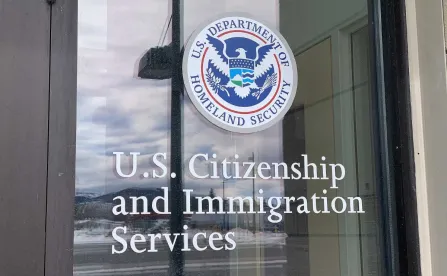By September 30, 2023, Congress will again have to fund the government. Despite ongoing efforts by the administration and Congress, indications are that a shutdown may occur at the beginning of the fiscal year, on October 1. Should a shutdown occur, it will affect a number of immigration- and visa-related agencies and processes.
USCIS
Because USCIS is fee-funded, it generally continues working even during a government shutdown. However, there are a few programs that stop because they receive appropriated funds:
- EB-5 Immigrant Investor Regional Center Program
- Conrad 30 J-1 Program for physicians
- Non-ministerial religious workers visas
E-Verify and the Optional Alternative Remote Verification Process
Because E-Verify receives appropriated funds, it stops during a shutdown.
It may not be possible to:
- Enroll in E-Verify;
- Create an E-Verify case;
- View or take action on any case;
- Add, delete, or edit any user account;
- Reset passwords;
- Edit company information;
- Terminate accounts;
- Run reports; or
- Resolve Tentative Nonconfirmations (TNCs).
In the past, during shutdowns, E-Verify has suspended the “three-day rule” and extended the time period for resolving TNCs.
We anticipate the same should another shutdown occur as of October 1. E-Verify employers who utilize the new optional alternative verification process will need to pay particular attention to ensure that they continue to meet all E-Verify requirements. Employers who are enrolled, and participating in good standing, in E-Verify likely will continue to be eligible to use the optional alternative remote I-9 process – even if E-Verify is not available, once the shutdown is over. Employers will need to timely create E-Verify cases.
Employers using the optional alternative verification process are reminded that, regardless of any shutdown, they still must take the following steps within three business days of the first day of employment:
- The employee must transmit a front and back (if the document is two-sided) copy of the identity and employment authorization documentation to the employer;
- The employer must examine the copies of the Form I-9 documentation or an acceptable receipt to ensure that the documentation presented reasonably appears to be genuine;
- The employer then must conduct a live video interaction with the individual who must present the same documentation to ensure that the documentation reasonably appears to be genuine and related to the individual;
- The employer will then indicate on the Form I-9, by completing the corresponding box (that will be on the updated Form I-9), that an alternative procedure was used to examine documentation to complete Section 2 or for reverification, as applicable; and
- The employer must retain, consistent with applicable regulations, a clear and legible copy of the documentation (front and back, if the documentation is two-sided).
Employers are advised not to take any adverse action against an employee while an E-Verify case remains in limbo.
Department of Labor (DOL)
DOL would shut down. The FLAG and PERM systems are inaccessible and BALCA goes into a holding pattern. If this were to happen, DOL is expected to suspend some deadlines. Remember that USCIS cases that require Labor Condition Applications or Labor Certifications such as H-1Bs, E-3s, H-2Bs or PERMs will be affected.
Department of State (DOS)
Like USCIS, visa and passport operations are fee-funded and would continue despite a government shutdown. But certain consular operations can be affected if the post has not collected enough in terms of fees. Given the slowdowns and backlogs at consulates due to COVID-19, a government shutdown could just add to ongoing delays.
Customs and Border Protection (CBP)
Because CBP staff are “essential workers,” ports of entry continue to operate during a shutdown, but application processing can be affected.
U.S. Immigration and Customs Enforcement (ICE)
ICE continues its enforcement and removal operations. The ICE Student and Exchange Visitor Program is fee-funded, so it will continue to operate.






 />i
/>i

